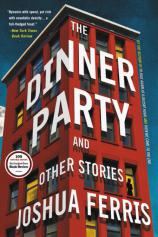The Dinner Party and Other Stories
Review
The Dinner Party and Other Stories
After three popular and critically praised novels, Joshua Ferris finally has produced a collection of short fiction, and it's an impressive one. Comprising 11 edgy and well-crafted stories, six of which previously have appeared in The New Yorker, the theme of THE DINNER PARTY is the breakdown of communication, most notably in our intimate relationships.
Roughly half of the collection's stories are set in New York, or feel as if they are, though the precise locations often aren't sharply defined. The title story concerns what appears on the surface to be a simple miscommunication about the date of a dinner party, but soon devolves into a painful encounter between a childless husband and wife. "Why do I have this life?" she asks him plaintively, as she poises over a half-packed suitcase, balancing on the razor's edge of a marital breakup.
"A Night Out" and "The Stepchild" also feature New York couples whose relationships are on the verge of collapse. It's impossible to tell whether their communications failures are a symptom of marital disease or its cause. In the former, Sophie abandons her husband Tim, whom she suspects of an affair, on an evening they're meeting her parents for dinner. Tim's efforts to reach her as he wanders the city are as frantic as they are fruitless. In the latter, the wife of an actor named Nick apparently deserts him after a trip to the store for bagels and the Sunday paper. That event propels him to the apartment of a woman he's just met at a charity gala, but on the way he discards his cell phone in a trash can, only to find it's gone when he returns to retrieve it.
"As he's demonstrated in each of his novels, Joshua Ferris is a writer who's keenly attuned to the unsettled quality of our times. THE DINNER PARTY's lightning flashes of insight are yet further evidence of that talent."
Especially in these New York stories, Ferris reveals himself as an heir to the work of John Cheever. His characters lead outwardly privileged lives, yet those same lives are infected with vague, ill-defined longings. The story "Fragments," in which the unnamed protagonist hears on his cell phone what appears to be a conversation between his wife and her lover, and then consists of little more than overheard conversations as he makes his way around New York, evokes the spirit of Cheever's "The Enormous Radio."
"The Breeze" is another story with the feel of some of Cheever's more experimental fiction. In it, a series of alternative spring evening outings unfold for Sarah and Jay, some satisfying and others deeply unsettling. In the midst of one, Sarah wonders about the "haltings and blinders of an entwined life: the fact of Jay, the disequilibrium of having to take what he wanted into consideration, whatever that might be."
But Ferris doesn't limit himself to the narrow confines of privileged Manhattanites, and when he leaves the island, the results are striking.
In "The Valetudinarian" (you may need to look the term up, as I did), Arty Groys, a retired widower living in a condominium on Naples Bay, who's been "living as a dead man for years," finds his life upended after an encounter with a prostitute one of his friends gives him as a birthday gift. "They don't give you a manual" is Arty's mantra for the bewilderment that seems to characterize his efforts to deal with the world.
"The Pilot" is an expert depiction of social anxiety. Its protagonist, Leonard, is an aspiring screenwriter invited to a party at the home of a successful Hollywood showrunner. From his musing over whether the invitation was an inadvertent "contacts mishap" (an accidental email to the host's entire contacts list), to his decision to dress like a TV personality known as the "Coach," it's a penetrating portrait of one man's existential angst.
Although his first novel, THEN WE CAME TO THE END, was set in an office, Ferris isn't overly concerned with the world of work. The sole exception is "More Abandon (Or Whatever Happened to Joe Pope?)," the story of a middle manager who's possessed of the "kind of envy that has no object but the vague conviction that other people are happier and getting more out of life than he is." His ill-advised decision to stay after hours in his Chicago office tower launches him on the road to career self-immolation. Even that tale features a communications breakdown, as he unwisely confesses his love for a co-worker on her voicemail.
And Ferris' take on the loss of our ability to communicate isn't limited to the gap between men and women. "A Fair Price," which concludes the book, features a shocking ending after Jack, who's hired a stranger named Mike to help him with a move, finds his displeasure over his taciturn assistant's nature boiling over.
As he's demonstrated in each of his novels, Joshua Ferris is a writer who's keenly attuned to the unsettled quality of our times. THE DINNER PARTY's lightning flashes of insight are yet further evidence of that talent.
Reviewed by Harvey Freedenberg on May 26, 2017
The Dinner Party and Other Stories
- Publication Date: May 29, 2018
- Genres: Fiction, Short Stories
- Paperback: 256 pages
- Publisher: Back Bay Books
- ISBN-10: 0316465968
- ISBN-13: 9780316465960





